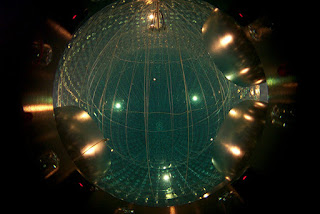Topics: Chemistry, Electron Configuration, Particle Physics, Nuclear Physics, Theoretical Physics
Yotta is the largest decimal unit prefix in the metric system, denoting a factor of 1024 or 1,000,000,000,000,000,000,000,000. It has the unit symbol Y. The prefix name is derived from the Ancient Greek οκτώ (októ), meaning "eight", because it is equal to 10008. Wikipedia
The best measurement yet of the lifetime of the electron suggests that a particle present today will probably still be around in 66,000 yottayears (6.6 × 1028 yr), which is about five-quintillion times the current age of the universe. That is the conclusion of physicists working on the Borexino experiment in Italy, who have been searching for evidence that the electron decays to a photon and a neutrino; a process that would violate the conservation of electrical charge and point towards undiscovered physics beyond the Standard Model.
The electron is the least-massive carrier of negative electrical charge known to physicists. If it were to decay, energy conservation means that the process would involve the production of lower-mass particles such as neutrinos. But all particles with masses lower than the electron have no electrical charge, and therefore the electron's charge must "vanish" during any hypothetical decay process. This violates "charge conservation", which is a principle that is part of the Standard Model of particle physics. As a result, the electron is considered a fundamental particle that will never decay. However, the Standard Model does not adequately explain all aspects of physics, and therefore the discovery of electron decay could help physicists to develop a new and improved model of nature.
Physics World: Electron lifetime is at least 66,000 yottayears, Hamish Johnston

Comments